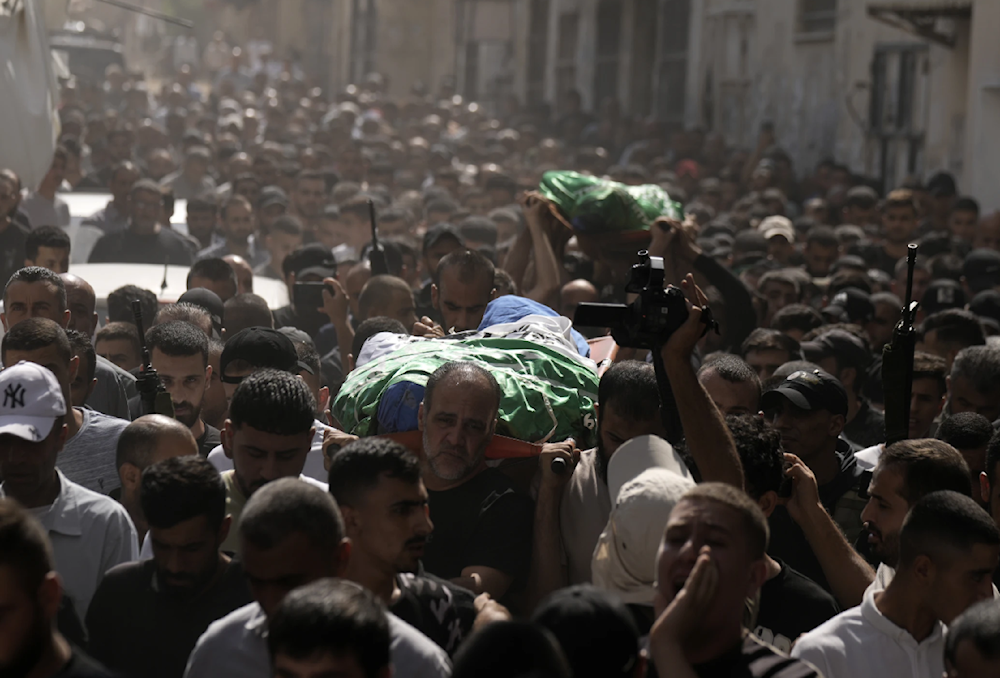Pezeshkian, Malaysia PM call for halt to genocide in Gaza
Both leaders attributed the continued crimes of this regime against the oppressed people of Gaza to Western support and emphasized the necessity for unity and coordinated action among Islamic countries
-

Mourners march during a funeral with the bodies of Palestinians killed by Israeli strike in Jenin refugee camp in the West Bank city of Jenin on August 18, 2024 .(AP)
Iranian President Masoud Pezeshkian and Malaysian Prime Minister Anwar Ibrahim have criticized the policies of the US and some Western nations regarding the war on Gaza.
During a phone call on Monday, Pezeshkian and Ibrahim discussed their bilateral relations and the latest regional developments, particularly the ongoing efforts to establish a ceasefire in Gaza.
The two leaders condemned the actions and policies of the US and certain Western countries, particularly their media and weapons support for the Zionist regime, which they argue contradicts claims of upholding human rights and working towards a ceasefire in Gaza.
They attributed the continued crimes of "Israel" and the oppression in Gaza to Western support. They emphasized the necessity for unity and coordinated action among Islamic countries to address these violations and suggested convening a meeting of Islamic cooperation leaders would be a significant step in this effort.
On day 318 of the genocide in Gaza, the total number of Palestinians killed since the Israeli aggression on the Gaza Strip started on October 7 has risen to 40,139, with 92,743 injuries, according to the daily report published by the Health Ministry in Gaza on Monday.
"Israel" committed three massacres within the past 24 hours, killing 40 Palestinians and injuring 134 others.
While some victims were transported to partially functioning hospitals, many remain trapped beneath the rubble, with rescue crews unable to reach them.
Dr. Marwan al-Hams, director of field hospitals at the Palestinian Ministry of Health, told The Guardian last week, "This figure, 40,000, includes only those bodies that have been recovered and buried."
Dr. Hams estimates that approximately 10,000 people remain trapped beneath buildings leveled by the Israeli occupation army, due to a critical shortage of heavy machinery and fuel necessary to clear the steel and concrete debris in search of them.
In the past 10 months, the Israeli aggression has led to mass displacement into overcrowded shelters and makeshift tents, hunger due to dwindling aid shipments, and dire shortages of clean water and sanitation, which have led to the spread of diseases.
Hamas responds to ceasefire proposal, blames Netanyahu for stalling
According to a statement made by the Palestinian Islamic Resistance Movement Hamas Sunday evening, the movement has "acted with full responsibility" towards mediators in Qatar and Egypt and considered the proposals aimed at reaching an agreement to stop the aggression in Gaza and to conclude a captive agreement.
The movement reported that this was done to "spare the blood of our people and put an end to the genocide, ethnic cleansing. and brutal massacres" being waged on the Palestinian people by the Israeli occupation.
The movement also said it endorsed the mediators' plan in May welcomed Joe Biden's statement and the text of the UN Security Council resolution, and replied positively to the mediators' proposal on July 2, 2024.
After the trilateral statement, Hamas said it urged mediators to present a plan to implement the proposal so negotiations do not become a vicious cycle, referring to how it has been made clear that Netanyahu's stalling and adding obstacles to prolong the aggression and buy himself more time in power.
"After listening to the mediators regarding what transpired in the latest round of talks in Doha, it became clear to us once again that Netanyahu is still placing obstacles in the way of reaching an agreement, setting new conditions and demands aimed at thwarting the mediators' efforts and prolonging the war," the statement detailed.
Hamas detailed how the new proposal aligns with Netanyahu's conditions, particularly his refusal to a permanent ceasefire, the complete withdrawal from the Gaza Strip, his insistence on continuing to occupy the Netzarim axis, the Rafah crossing, and the Philadelphia corridor."
Netanyahu set new conditions for the prisoner exchange and backed down on other commitments, which prevented the completion of the exchange deal.
The resistance movement held Netanyahu "fully responsible for the failure of the mediators' efforts, the obstruction of reaching an agreement, and full responsibility for the lives of his captives, who are exposed to the same danger as our people due to his continued aggression and systematic targeting of all aspects of life in the Gaza Strip."

 4 Min Read
4 Min Read








